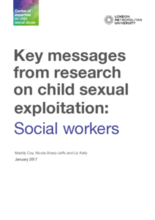This briefing paper is for social workers. It brings together key messages from research on child sexual exploitation with implications for practice and should be read in conjunction with guidance for professionals.
Key messages
■ Child sexual exploitation can happen to young people from all backgrounds. Whilst young women are the majority of victims, boys and young men are also exploited.
■ Some young people may be more vulnerable – those who have experienced prior abuse, are homeless, are misusing alcohol and drugs, have a disability, are in care, are out of education, have run away/go missing from home or care or are gang-associated.
■ Anxiety, shame and guilt are powerful barriers to young people seeking help.
■ If exploited young people are also involved in criminal activity they may be seen only as offenders rather than as victims of exploitation.
■ Support needs to be intensive and relationship-based if it is to act as a counterbalance to the ‘pull’ of exploiters.
■ Encouraging young people to talk is critical – social workers need to use ‘professional curiosity’, finding respectful ways to ask difficult questions.
■ Re-engaging with education, friends not linked to exploitation, and family can help young people reconnect with essential ‘social anchors’.
■ Intelligence sharing with police (including nicknames, addresses, ‘hot spots’, mobile numbers, taxi firms, car registrations etc.) can contribute to local disruption efforts.

